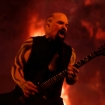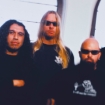A world without Slayer. It's kind of a hard thing to imagine, isn't it?
Truly, it feels like Slayer have been around forever. If you're 40 years old or younger, the groundbreaking thrash band literally has been in action for all of your conscious life. But even for us oldsters who can still vividly remember when Show No Mercy was released in 1983, there has always been something weirdly elemental about Slayer, as if that seminal debut LP had somehow lurched angrily to life from a jagged tear in the earth's crust. If they weren't actually demonic emissaries from the brimstone pits of Hades, per se, they were at least channeling an energy so dark and virulent that it seemed to practically pre-date the existence of humanity. The band would become more powerful and polished over time, of course, but even from the beginning, Slayer were Slayer. It was as if — to paraphrase fellow Lucifer-invoker Roky Erickson — they had always been here before.
And, if you caught them live back in the day, they were absolutely terrifying. For so many headbangers, the story of your first Slayer show inevitably includes a sidebar about who they blew off the stage that night. In my case, I saw them absolutely mop the floor with Overkill and Motörhead — that's right, they even made Motörhead look tired and slow — on the World Sacrifice tour in November 1988, at the Mid-Hudson Civic Center in Poughkeepsie, New York. Tom Araya, Kerry King, Jeff Hanneman and Dave Lombardo were absolutely relentless that night, burning flawlessly and mercilessly through most of the recently released South of Heaven, while also tossing selections from earlier albums (like "Raining Blood" and "Necrophiliac") to the crowd like chunks of raw meat to a frenzied wolf pack. The musical mayhem only let up long enough for Araya to growl such probing questions at the crowd as, "Is there lots of PUSSY-LICKIN' in Poughkeepsie?" or "Do you want to DIE?"
If Araya was attempting to further rile the fans up with his stage banter, it was completely unnecessary. To this day, I have never been part of a crowd that was so fully intent on fucking shit up as the one that swarmed the MHCC that night. Unlike at the infamous "seat cushion riot" that had occurred three months earlier at NYC's Felt Forum, there were no chairs on the floor of the arena to hurl or destroy. Instead, fired up by Slayer's merciless assault, a sizeable portion of the crowd simply turned on each other. The pit itself was insane enough, but when two gigantic, denim-clad dudes started whipping lit firecrackers into the throng, my friends and I took the hint and hastily retreated to the back of the venue, where we could enjoy the rest of the show (and marvel at the ensuing carnage) from a relatively safe distance. Up until then, I'd always laughed at the absurd notion (which had recently made a comeback via the PMRC hearings in Washington) that heavy metal was truly Satanic in nature, but after experiencing the all-consuming darkness that Slayer conjured up that night, I suddenly wasn't so sure. And, of course, that just made me love them all the more.
If Slayer had called it a day after the one-two spiked fist punch of Reign in Blood and South of Heaven, their place in music history would have already been more than assured. Not only have those two albums profoundly influenced countless metal bands, but their punishing riffs have also been sampled dozens of times by rap, industrial and electronic artists. But Slayer didn't stop there. Instead, they kept on releasing records (including classics like 1990's Seasons in the Abyss and 2001's God Hates Us All) and delivering brutal live shows — and unlike the remaining 75 percent of thrash's "Big 4," they never once lost their way, chased commercial success (OK, maybe the Iron Butterfly cover wasn't the best idea, but that was completely on Rick Rubin) or forgot what made them so great in the first place. Despite label problems, lawsuits, controversy, lineup changes and even Hanneman's death, Slayer soldiered steadily onward, their musical (and lyrical) course as fixed as a ship with its steering wheel cemented in place. "Repentless," the title track of the band's most recent album — and the only one recorded without Hanneman — not only sounded like classic Slayer, but it could easily serve as a theme song for the band's entire career.

But after Saturday night's show at the L.A. Forum, it's supposedly all coming to an end. Of course, Slayer have been flogging their farewell tour since early 2018, and the opening night of its "Final Campaign" leg proved that the band is still a well-oiled thrash-metal machine that could probably keep charging along for years to come. But for whatever reason — Araya and King, the two remaining original members, haven't been particularly talkative on the subject — there will be no more Slayer gigs, and allegedly no more Slayer albums, either. And that's a difficult concept to fully wrap your mind around, especially if you've been a Slayer fan for well over three decades.
This is not to say, however, that Slayer are about to be completely wiped from the face of the earth. The band's management has spoken of taking the band into "legacy mode," concentrating on brand marketing in an effort to keep Slayer's name and pentagram logo in steady circulation, even without new tours or releases to spur merch sales. And then, of course, there's that uncompromising Slayer catalog, which isn't exactly going anywhere. Having aged far better than those of many of their contemporaries or acolytes, those records will continue to be discovered by new fans — as well as to inspire musicians and serve as fertile sample fodder — until the rising oceans drown us all.
Back at the height of the Eighties thrash explosion, there was a persistent rumor going around that "Slayer" was actually an anagram for "Satan Laughs As You Eternally Rot" — a rumor that probably gained the band as many or more new fans as it did horrified detractors. But given the deathless, visceral brilliance of such classic Slayer songs as "Angel of Death," "Dead Skin Mask," "War Ensemble," "Mandatory Suicide," "Payback" and "Jihad" — and those songs' ability to still piss people off — "Slayer Lives As You Eternally Rock" might actually make more sense. Slayer may be officially done, but Slayer's groundbreaking, uncompromising music will never die.








